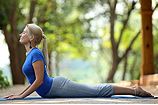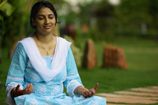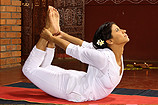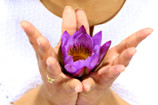A very gentle yet deep yoga technique, Padma Sadhana, is experiencing meditation through asanas (yoga postures). The entire Padma Sadhana sequence is 40-minute long, which includes 10 minutes of yoga postures, 5 minutes of pranayama (breathing technique), 20 minutes of meditation, again followed by 5 minutes of pranayama. The yoga postures in Padma Sadhana flow into each other, with each yoga pose complementing the preceding one. When done correctly, Padma Sadhana stretches the body and prepares the mind for meditation. In fact, each yoga posture in the Padma Sadhana sequence becomes a meditative experience by itself.
Just as it is important to know how to do Padma Sadhana (move the body into yoga postures). It is also important to practice Padma Sadhana with the right attitude, the right feeling.
Follow the five tips and make your Padma Sadhana experience blissful, deep and meditative.

#1 Keep the body stable. When you get into any posture for Padma Sadhana, ensure that you are not very unsteady or uncomfortable. Meditation happens when the body is at ease. The Patanjali Yoga Sutra, Sthira Sukham Asanam, gives prime importance to both stability and comfort while doing your asanas (sthira=stable; sukham=comfort).
If your body is shaky in a particular posture, it means you are overdoing. Find a position that is stable and comfortable for you.

#2 Be aware of what is happening. Once you have attained stability in the yoga posture, move on to the next level – awareness.
Simply being stable in a yoga pose can either bring dullness or make the mind wander. For instance, in Shavasana (Corpse Pose), you can be stable in the position but what if you go off to sleep? Or you start forming a chain of thoughts in your mind?
Yoga is doing the yoga postures with the awareness that 'I am doing the stretch, my breath is moving in and out, my heart is beating, my thoughts are coming and going.' This doesn’t mean that one keeps thinking – I am doing this stretch and my heart is beating. It simply means drawing your attention to this and then letting go of the thought. When the mind experiences this state of awareness, being totally in the present moment, it slips into meditation.

#3 Let the yoga poses flow gracefully like a dance. The whole beauty of Padma Sadhana lies in the graceful manner in which it is carried out. You may be totally aware of the movement but you may just be doing it mechanically like a robot. Moreover, there are chances of injuring yourself while doing a stretch with a jerk or with stiffness. With awareness, you can bring grace in your postures. Do them very gently, coordinating each body movement with the rhythm of breath consciously. Moreover, doing yoga poses gracefully with a smile relaxes the mind.

#4 Strive to develop perfection. Simply being graceful in your movements, even though you don’t get them right, again doesn’t help. You need to perfect your yoga posture too. Again, with awareness you are able to identify if you are doing a posture gracefully but not being able to stretch more than a point to get the asana right. This becomes possible with regular practice and a bit of effort.
Take for example the Bow Pose (Dhanurasana). If you find it difficult to hold that pose for long, keep practicing daily and you will notice the posture becoming effortless and more graceful over the days.

#5 Go beyond the body. Padma means lotus. Just as a lotus blossoms, one’s potential can also expand with the practice of Padma Sadhana.
How does this happen? Certainly all the four tips above contribute – yet the real secret is this: go beyond the body.
All of us want to achieve that perfect posture and would be satisfied if we could do a series absolutely perfectly. But you’re a yogi! As a yogi, you know it is not wise to get stuck at the perfection level of the asana - go beyond and observe what is happening inside of you. Are you experiencing the true essence of yoga: the union of the body, mind and spirit?
Based on inputs by Dinesh Kashikar, International Sri Sri Yoga trainer. You can find Padma Sadhana instructions and explanation by Dinesh Kashikar in Padma Sadhana DVD available in Art of Living Store.
Yoga practice is not a substitute for medicine. Please consult a doctor before practicing yoga postures. It is important to learn and practice yoga postures under the supervision of a trained Sri Sri Yoga teacher. Find an Sri Sri Yoga course at an Art of Living Center near you. Do you need information or share feedback? Write to us at info@srisriyoga.in.
